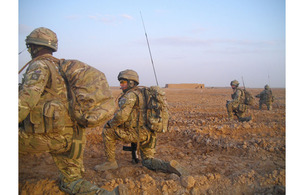Reduction of 500 Service personnel from Afghanistan explained
The Prime Minister announced last year that there would be a reduction of 500 UK personnel by the end of 2012. In a statement to the House of Commons today, 26 April 2012, the Defence Secretary announced how the reduction will be managed based on military advice.

British soldiers on operation in Helmand province, southern Afghanistan (stock image) [Picture: Crown Copyright/MOD 2012]
Outlining the growing strength and capability of the Afghan National Security Forces (ANSF), Mr Hammond confirmed that the majority of the 500 reduction will be made up of combat troops, reflecting the pace of transition of this role to Afghan forces.
He also explained that UK forces headquarters in Nahr-e Saraj (North) and Nahr-e Saraj (South) would be merged to better align with Afghan administrative boundaries whist also delivering efficiencies and manpower savings.
Thirty-six of Task Force Helmand’s checkpoints, patrol bases and military positions have been handed over to the Afghan National Security Forces in the past six months, while a further 16 new posts have been constructed and occupied by Afghan Forces.
Mr Hammond said:
This announcement reflects the continuing progress being made by the Afghan security forces.
The ever greater ability of the Afghans to manage their own security is allowing a gradual and deliberate drawdown of UK and International Security Assistance Forces.
The majority of the 500 British troops being withdrawn this year will be combat troops, and a further 200 combat troops will be transferred from a ground holding role to Security Force Assistance teams working with the ANSF.
This will take the United Kingdom’s enduring conventional force levels to 9,000.
We will also withdraw some combat support capabilities for which there is no longer an operational need as a result of the availability of alternative weapons systems in theatre.
The Defence Secretary reiterated that the withdrawal of 500 personnel this year was consistent with the process of transition to Afghan forces agreed by ISAF nations at Lisbon in 2010.
He also emphasised the UK’s commitment to Afghanistan for the long term, as demonstrated by the recent announcement that the UK would commit £70m per annum in funding for the ANSF, in addition to the taking the lead in setting up an Afghan National Army Officers’ Academy in Kabul after the combat mission ends in 2014.
The Defence Secretary paid tribute to the commitment, professionalism and bravery of the more than 100,000 members of the UK armed forces who have served in Afghanistan since 2001.